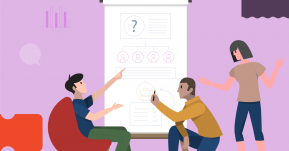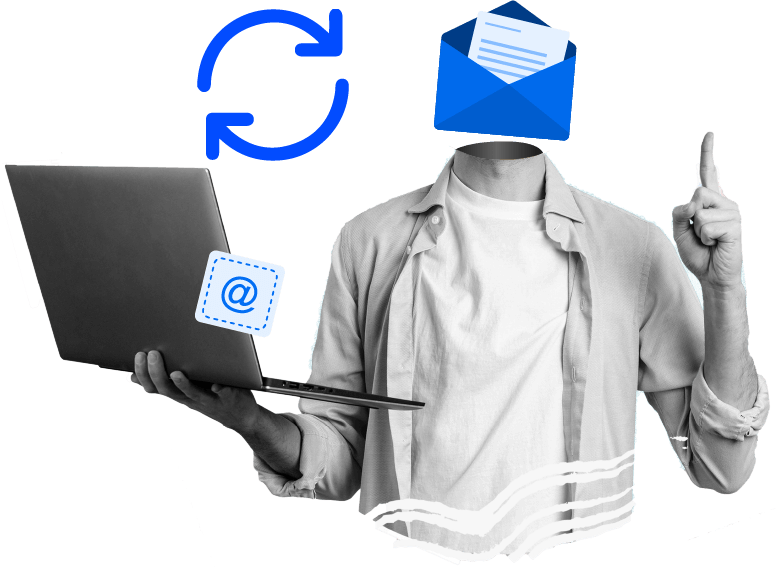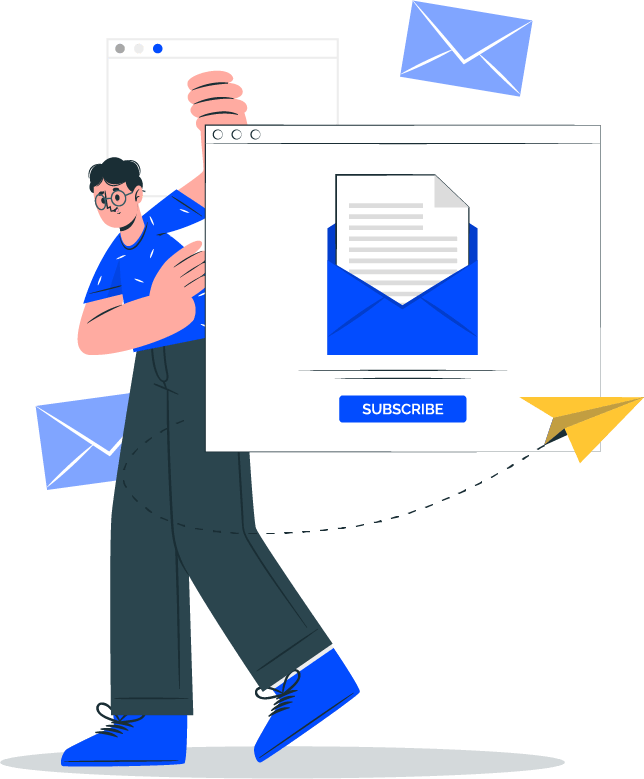Preparing for a remote job interview is as important as preparing for an in-person interview. Transitioning from working in an office to working from home is not the same, hence you should understand what it takes to work remotely and prepare well for the remote job interview questions and answers.
Hiring managers in Maryland are aware of the challenges that remote working entails, thus you must be prepared to answer questions that focus on remote work skills apart from those specific to the job role and industry. Fret not, we have collated a list of the 20 top remote job interview questions and answers you should know to ace your remote job interview!
1. Common Traits And Skills Recruiters Seek While Interviewing Remote Job Candidates
1.1 Communication Skills
Communication skills are important at work, be it in an in-office setup or while working remotely. Good communication skills help in conveying your thoughts and ideas clearly to your colleagues, teammates, juniors, and the senior management. Asynchronous communication is widely used in remote working - modes such as email, chat, team channels, etc. are used where writing skills are important to convey your message effectively.
1.2 Time Management
Time management can be both an advantage and a disadvantage while working remotely. In the absence of physical check-in norms in an in-office setup, employees have to schedule their time effectively while working virtually so that it doesn’t cause any problems for the team and the company. If you want the answer to the question ‘how can I impress an online interview?’, this is an important aspect.
1.3 Self-Motivation
Remote working can often lead to a decrease in motivation and enthusiasm as you aren’t working with your team and colleagues in a physical office, you are on your own. Employees need to stay motivated and engaged in order to work efficiently and stick to their schedule as planned.
1.4 The Ability To Work Independently
Remote employers often prefer employees who are self-starters. Distant teams that work across geographical locations and time zones should be able to work independently and take their own decisions. In this case, majority of the communication would be asynchronous, hence employees must work independently and rely less on others.
1.5 Collaboration And Organisation
Without a physical space and real-time communication, collaboration could be a challenge. Remote workers must learn to collaborate via different collaboration tools when needed, and plan their work and schedule with their team effectively. They should be able to organize their tasks efficiently without causing any roadblocks for the team. If you want the answer to the question ‘how can I impress an online interview?’, this is an important aspect.
2. 20 Common Remote Job Interview Questions And Sample Answers
2.1 Why Do You Want To Work Remotely?
Remote employers would want to know the reason you have opted to work remotely, in case there is already an in-office setup available in their company, or if you were working from an office for a long time before this. This would let the employers know your thoughts behind working remotely and see if it aligns with their business goals.
How to answer:
Be honest about why you would like to work remotely, and answer confidently. Have a clear idea about the reasons you want to convey, and why remote working suits you the best in this role. It could be anything- remote working helps you be more productive, you’d be able to travel more, spend more quality time with family, etc. Explain how it would be mutually beneficial.
Sample answer:
"I am excited because working from home allows me to collaborate with a company I admire. I would not have been able to offer you my services in other circumstances because of the distance. My creativity is at its best in my home office, and I am convinced I can contribute to the success of your business."
2.2 What Types Of Remote Or Distributed Team Tools And Software Have You Used Before?
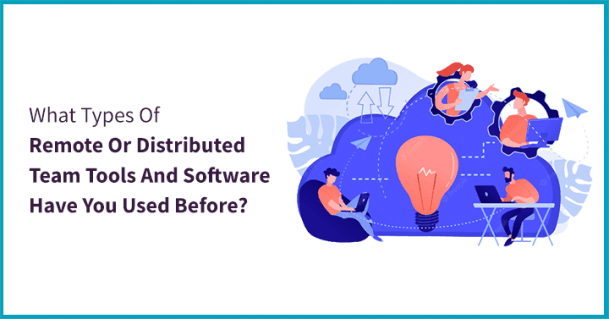
Since distributed teams heavily rely on asynchronous communication, employers would like to know what remote collaboration tools and software are you familiar with so that you would be able to work seamlessly if you’re already familiar with a tool they are already using. This is one of the top questions in the remote job interview questions and answers list.
How to answer:
You can list out the tools and software you have worked on in the past, and explain how and why your team used them. It would help the employers understand what features of the tools you are familiar with and how it helped in your work. You can also mention the tools you’d like to learn to expand your scope.
Sample answer:
“In my previous marketing role at GooseChase, we used a mixture of Salesforce, Intercom, ActiveCampaign, and SendGrid to engage customers across their lifecycle. For project management, we used Asana and for real-time communication, we used Zoom. I also like to think that I'm pretty good at picking up new tools and assessing which ones are right based on the company's needs.”
2.3 How Do You Maintain Effective Communication And Collaboration With A Distributed Team?
Hiring managers would want to know how you would maintain a remote work dynamic with your team. Since the majority of communication would be asynchronous, you need to be careful about your interactions with your colleagues, especially if they’re at a different time zone. This is an important aspect while answering the question ‘How do you do a remote video interview?’.
How to answer:
Have a detailed answer with specific examples or instances from your previous work prepared. If you haven’t worked remotely before, you can answer what you would do in certain situations. You can ask follow up questions to the hiring manager about how their team handles distributed communication to show that you’re interested in understanding the firm’s team’s dynamics.
Sample answer:
“I think a varied approach to communication is ideal, as the best method of communication depends on the scope of the question or project you’re working on. To start, I think having regular team meetings over video is a great way to stay connected and keep everyone on the same page. I’m also diligent about checking Slack and email. I think Slack is a great way to handle quick, simple questions or to share brief updates. Lastly, I like to check in with everyone on my team to ask what the best way to get in touch with them would be if I need to speak with them as soon as possible. So, for example, if I know that my boss prefers that I text them when something unexpected comes up, I’ll know not to waste my time waiting for them to respond to an email. How does the marketing team here tend to communicate and collaborate?”
2.4 How Do You Manage Your Time And Stay Organised?
While working remotely can be flexible for many, it could also be a challenge to stay organised and to stick to the schedule. Interviewers want to ensure you know how to manage your time and tasks at hand, and meet the deadlines without much hassle.
How to answer:
You can talk about the tools and strategies you’ve used or would like to use to manage your tasks and keep track of time. You would want to set an agenda every day with your tasks listed according to priority, and also keep your team and managers updated about your goals and your calendar.
Sample answer:
“I keep a running daily and weekly to-do list in my notes app and rely heavily on my calendar for meeting and deadline reminders. I usually prioritise my tasks based on due dates and level of importance, and check in with my team every morning to make sure we’re on the same page, as priorities can always shift. I also like to share calendars with my team, so we always have an idea of when everyone is or isn’t available.”
2.5 Tell Me About Your Favourite/Least Favourite Aspects Of Your Job?
This is one of the most common questions asked by interviewers to usually know if you’re a good fit for the role. For example, if you are into someone who likes hosting in-person events and likes interacting with people, a remote job wouldn’t be right for you.
How to answer:
You can prepare an answer with instances from your previous roles, and explain why you like some aspects and why you don't. You can add points to why the role you are currently interviewing for would be a good fit for you, with references to the question being discussed. This is one of the top questions in the remote job interview questions and answers list.
Sample answer:
"My favourite parts of my job are days when I can code for 4-6 hours without interruption and then relax. Not only does this give me excellent work-life balance, I feel that I also produce my best work for the company. My least favourite aspect of my job are the days that are filled with meetings. Software engineering requires hours of interrupted time to do well and a day full of meetings does not help with that!"
2.6 How Do You Keep Yourself Motivated And Engaged When Working Remotely?
Interviewers would want to know that you understand it is important to stay motivated and engaged while working remotely. No matter how comfortable and flexible working from home could be, it can also be quite distracting. Kitchen sounds, construction noises, kids wanting to play, Roommates playing Netflix in the background, etc. Hiring managers would want to know how you would tackle distractions in order to work efficiently.
How to answer:
Answer from your experiences, as it should be an honest answer. Talk about the various time management/ productivity software tools you use or would like to use while working remotely. Tell how it helps you get into deep work and allows you to focus.
Sample answer:
"I'm a big fan of Cal Newport's book Deep Work. Deep work describes the ability to focus without distraction on a cognitively demanding task. This distraction-free concentration pushes my cognitive abilities to their limit and allows me to create new value and improve my skills quickly. I also find that remote work allows me to avoid context switching, reducing attention residue and allowing me to get into flow. I'm really motivated by finding flow."
2.7 How Do You Process Information?
Managers would like to know if you’re someone who finishes tasks once you understand the whole picture or just wants to know what’s due when, and just needs to know that much. It is important to understand the team dynamic and know how someone works- if one wants to know all the facts, or just needs to know what’s the task at hand.
How to answer:
Speak from your experience, and convey what’s best for you. If you work in a team, it would be helpful for you to learn how your coworkers operate. Be open about how you work and how you get your tasks done.
Sample answer:
“If you can be an information hoarder, I am one. I do my best work when I understand the goals behind a project, its scope, and the whole big picture. I get the most ideas (and ideas are important in content) when I can picture how my work fits into the grand scheme. I know it can be a weakness, especially if I’m not the team leader on a certain project, so I try to ask key questions that will get me in the zone – questions like, What problem are we solving with this project? and What is our marker of success?”
2.8 How Do You Handle Your Calendar And Schedule? What Apps/Systems Do You Use?
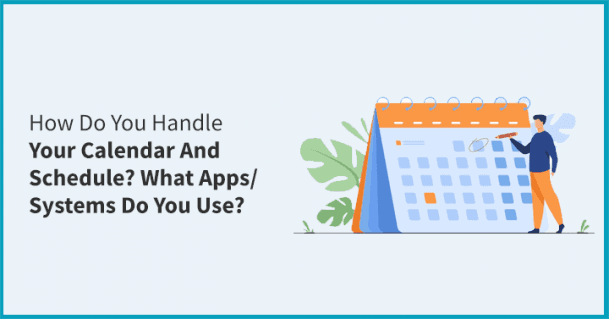
It is crucial to have an organised work life while working virtually. Managers would want to know what tools you would use for your time tracking and scheduling, and if you share your calendar with your team. It would show how much thought you put into organisation, which is a must. This is an important aspect while answering the question ‘How do you do a remote video interview?’.
How to answer:
“Meeting deadlines is important to me, so I use project management software to keep track of all my tasks and their due dates to stay organised. For the last few years, I’ve used a handful of calendars. I have colour-coded ones for errands, my day job, freelance work, etc. I like it mainly because of how fast and seamless the sync is between my laptop and phone. I prefer using a calendar where my coworkers can see my availability, and I can see theirs for a smooth collaboration.”
2.9 How Do You Handle Conflicts Within Your Remote Team?
This question helps employers know how you manage and remediate conflicts between remote coworkers. There could be disagreements and miscommunications while working virtually, so understanding the situation and knowing how to diffuse the conflict is an important skill.
How to answer:
To answer this question, give an example of a scenario you faced in your previous job role and how you managed to resolve it. Describe the situation, your goals, why the conflict arose and actions you took, and the result of those actions. This helps the managers understand how well you understand all aspects and consequences of working remotely.
Sample answer:
"I used to work as a product manager at ClickUp and would occasionally have to disagree with the direction that a product designer or software engineer was taking on a new feature, which could lead to heightened emotions. The framework I used in these situations was to think about my certainty and the impact of the decision. If I had low certainty and the impact of the decision was low, then I would allow them to do it their way and then help them measure the impact. In many situations, their way ended up being the right way! In situations when my certainty was high and the impact was high, I would overrule them and explain why."
2.10 How Do You Ensure Projects Are A Success When Working Remotely?
As real-time collaboration isn’t possible while working with distributed teams, interviewers would want to know your approach to ensure projects run smoothly. You must have experience to tackle any situation that has arisen in order to deliver projects efficiently and on time.
How to answer:
You can demonstrate any example from your past job roles and describe your experience in managing handling projects remotely. Convey the importance of written documentation, communicating progress at every step, have daily check-ins with the managers and the team.
Sample answer:
"It depends on the team and project, but I've found that writing out a six-pager that outlines the project's goals, timelines, and who will be responsible for what aspects is always a good idea. This allows people to collaborate across time zones without having to rely on synchronous communication. If we do need to have a kick-off meeting, I always make sure to record it so people who are unable to attend can watch and catch up."
2.11 How Do You Prioritise Tasks?
One of the advantages of working remotely is having more control over time. Hiring managers would want to know how you set your priorities, and what kind of tools or software you use for it. This would let them know you are completing your tasks on time as opposed to checking in in a physical office environment. This is one of the top questions in the remote job interview questions and answers list.
How to answer:
Discuss the strategies and tools you have used in the past to set your goals and prioritise your tasks, and to keep track of your progress. You could list the tools in order that worked the best for you, and also mention why. You could also find out what the manager’s team uses and how they plan their goals and progress.
Sample answer:
"I keep a Kanban board with five columns: P1, P2, P3, Backlog, and Done. I only allow myself to have one task in P1, two in P2, and three in P3. If something becomes a P1 then the current P1 moves to P2 and one of the P2s moves to P3, and so on. This makes it easy for me to communicate what I'm working on and my priorities. I also like to share this board with my team so they always have a clear idea of what I'm working on."
2.12 How Would You Handle The Lack Of Face-To-Face Contact When You Work Remotely?
It is now possible to collaborate and work with distributed teams without ever having to meet them IRL, but asynchronous communication can sometimes lead to miscommunication as tone cannot be conveyed via text. Hiring managers would want to know how you would handle such situations while working remotely.
How to answer:
Talk about how you could engage with your remote coworkers in your previous roles, or how you would like to interact with them to ensure there isn’t any miscommunication anywhere. You could talk about using specific conferencing software and tools, strategies to communicate more often, etc.
Sample answer:
"In my previous role at GitLab, I learned about the value of asynchronous communication and a writing culture. It's not always possible to get everyone on a video call when you are spread across the globe, so I learned how to effectively collaborate without a lot of real-time communication. I think many companies make the mistake of trying to rely heavily on synchronous communication in a remote environment when there's ample evidence that async work is better. What about you guys? How do you collaborate remotely? Are you more async or sync?"
2.13 How Do You Balance Your Work Life And The Rest Of Your Life?
As working remotely would have thin lines for boundaries for work life and personal life, employers would want to know what steps you would take to balance it. This is to ensure you are giving importance to your physical and mental health, and are not burning yourself out.
How to answer:
Talk about how you set your boundaries for work and personal time, and set an agenda everyday to work efficiently. List out any time tracking or productivity tools that you use or would want to use. Ensure you are keeping your physical health and mental health in focus, and are creating a healthy balance with work life and personal life.
Sample answer:
"I believe I manage my professional and personal lives well. I start my workdays by looking at my schedule and creating a list of prioritized tasks to complete during the day. The list usually begins with tasks that are my highest priority, which means I try to complete the assignments with the nearest deadline first.
By accomplishing this, I don't overwhelm myself attempting to complete tasks immediately before they're due. A list helps me finish my work on time, allowing me to relax at home before the next workday. I've been employing this strategy for a few years now and have found that this works best for me to achieve a healthy work-life balance."
2.14 What Do You Do When You Sense A Project Is Going To Take Longer Than Expected?
Sometimes, things don’t go as planned and unexpected hurdles cause your projects to take longer than expected. Employers would want to know how you handle such situations and what steps you would take to tackle it.
How to answer:
If you have come across such a situation in your previous job roles, you can talk about your experience and describe the scenario. Mention the hurdles, time taken, and the steps you took to manage the situation. Ensure that you always communicate the issues with your coworkers and managers so that they are aware of the delay, and the steps taken to overcome it.
Sample answer:
“I encourage anyone who’s remote to speak up as soon as you notice that things aren’t going as planned. That doesn’t mean complaining or panicking – just giving a “heads-up” that the project is a day or two behind schedule or that one of your designers came down with the flu and can’t finish the blog post design today. That gives everyone a chance to find solutions and adjust plans before it’s too late. I would check with another coworker if they can step in instead of the sick worker, or optimise things in the schedule that would work for us.”
2.15 How Do You Prepare For Meetings And Facilitate Meetings?
Meetings are as important as asynchronous communication while working remotely. It helps in ensuring the team is on the same page. Employers would want to know how you prepare for meetings and facilitate it when working virtually.
How to answer:
Talk about what kind of collaboration tools, project management tools, and note making tools you use while preparing and facilitating a meeting. These tools would automatically share the minutes of the meeting with the attendees and schedule the meeting in advance as well. Discuss your strategies on how you prepare the agenda, tackle questions and doubts, schedule an optimal time for the meeting with your distributed team and manage follow ups.
Sample answer:
"It depends on the team and project, but I've found that using a project management software like Miro that outlines the project's goals, timelines, and who will be responsible for what aspects is always a good idea. This allows people to collaborate across time zones. I always make sure to record the meeting so people who are unable to attend can watch and catch up."
2.16 What’s Your Biggest Concern About Working Remotely?
Employers would always want to know what is your biggest concern about working remotely, so that they are aware of your weaknesses and can help you overcome them, and ensure you are not put into something that you are not entirely comfortable with. This is one of the top questions in the remote job interview questions and answers list.
How to answer:
Know the areas you want to improve on, and convey what opportunities you would like to encounter these improvement zones. Be honest with the hiring managers about your weaknesses and challenges and that you are working on them.
Sample answer:
“My biggest struggle working remotely is generally finding the right balance of quiet time to get the work done and enough time with the team so that there is a good amount of communication, sometimes I get it just right and sometimes I find myself trying to catch up in one of those areas. Also, when you love what you do (like I do!) it can be tempting to work all day when you’re in the comfort of your own home, but you need to set your schedule and stick to it, if not your energy and WORK will suffer.”
2.17 What Is Your Most Valuable Asset When It Comes To Remote Work?
This question helps employers understand what are your strengths and how you leverage it while working remotely. This can give them an idea about your skills as well and if you are the right fit for the position.
How to answer:
Prepare an answer in advance about your strengths and convey it with situational examples from your previous job roles. Talk about what worked best for you, and how it helped your team, goals, and the company. Remote working needs you to be independent, great with communication, and technically adept.
Sample answer:
“My most valuable asset is my suite of mobile tech tools and gadgets! Without these tools, my life would be significantly more complicated – even the simplest task would take twice the amount of time. I make it a point to stay on top of technology tools that support the modern, mobile career. My entire life is in the cloud where it’s secure (!) but enables my work across devices and locations.”
2.18 Why Are You Interested In This Position?
This is a common question in interviews as it sets the tone for the conversation and shows your level of interest for the specific job role. It helps employers filter out candidates that aren’t interested.
How to answer:
Practise a good answer with self-reflection and research. Emphasise your interest in the role and the company culture. Discuss your career goals and opportunities that you are looking forward to. Talk about your accomplishments from your previous job roles and highlight why you are a perfect fit for this role.
Sample answer:
“I've been working at Mailchimp for a number of years, and while I value the friendships I've made and the skills I learned there, the recent acquisition has made me look for new opportunities. What excites me about this position and Customer.io is that I would get to learn about and sell a truly best-in-class automated messaging platform.
While this role is a big step up from my current content marketer role, I'm excited to take on new challenges and grow into the remote marketing manager role. My research has shown me that Customer.io is a great place to learn and level up your craft, and I'm committed to working harder than ever."
2.19 What Can You Contribute To This Company?

This is another common question for managers in remote job interview questions and answers. This is to assess why they should hire you as a candidate and what value you would bring to the company. They would want to know what your strengths and weaknesses are, and if you are a good fit for the role.
How to answer:
Focus on your past achievements and emphasise your role in your previous company. Relate it to the current role you are applying for, and ensure you have studied about the company, its goals, culture, vision, etc. Have a clear idea about the role you are applying for and its job description.
Sample answer:
"I can improve your email open rates. In my previous email marketing role, email open rates were falling off for our weekly newsletter and a large number of emails were not making it to our subscriber's inboxes. My task was to increase the open rate by at least 15 percentage points. The action I took was to design an email sunsetting policy that removed inactive contacts after a month and to A/B test subject lines each week to drive open rates up. I also setup a double opt-in policy that ensured only people who wanted to receive the newsletter would. The result was an increase in open rate from 13% to 35%."
2.20 Do You Have Any Questions For Me?
Interested candidates always ask for questions they are curious about pertaining to the company and their job role. This shows that you are excited about the role, and are doing your detailed research in order to be the right fit for the role. It is a good opportunity to learn about the company culture as well.
How to answer:
Keep in mind that your questions should be relevant to the specific job role and the company. Prepare a few questions in advance. Ask about the tools and software relevant to your job function they might be using. Enquire about their remote work culture and traits they look for in their employees.
Sample answer:
"Yes, I have a few questions about this role and the company. The first thing I'd love to know is what a typical day looks like. I'm also curious to know what job the last person who had this job is doing now? And finally, what you enjoy about working here!"
2.21 Ways to Answer “Tell Me About Yourself” in Your Interview
Despite being a traditional question in any interview, “Tell me about yourself” is a deceptively simple way of getting to know you and whether you would be a good fit for the company through your own background story. We share ways on how you can showcase yourself in the best possible way to make a great impression in your next remote job interview
How to answer:
Void a Verbatim Resume Recital
Since your resume has already been viewed, it’s a moot case to recite the resume word-for-word all over again. You can share bits and pieces of information that need to be reiterated, however, you also need to make sure that the rest of your response should give new insights or more character to your work profile outside the realm of the resume. This will make the interview more engaging and relevant to the job you are applying for.
Showcase Your Skills
You may have added a clicked or laundry list of skills on your resume that may seem relevant, but it’s wiser to highlight those that are specifically relevant to the job description. For instance, if you are applying for a role in sales or marketing, excellent communication as a skill won’t give you a lot of mileage. Instead, list down some specific technical software or tools such as Google Analytics that you use that can boost sales volume, web traffic, and more. This will give the interviewer something more solid to substantiate or evaluate.
Align Your Career Goals With the Role
Give the interviewer a valid explanation of why you think they should consider you as a long-term asset to the company. You can share your long-term goals and explain how they fit with the profile you are applying for, so it would be a benefit for the company too.
2.22 Ways to Answer “Why Are You the Best Person for This Job”
As another commonly asked question, the interviewer is looking for insights on what you can bring to the table with relevance to your skills and experience when it comes to the job you are applying for. Look at some of the professional sample answers shared here to help you create a well-articulated response/ that brings your strengths to the forefront and leave the interviewer with a favorable impression at your next remote job interview.
How to answer:
Specific Measurable Examples
Another one of our remote job interview tips is to share examples. The response you share needs to have quantifiable examples to back it up. These examples should be able to prove how you utilized your strengths or skills to bring out positive outcomes such as completed targets, increased sales or revenue, a boost in conversions, and more.
Tailor Your Strengths and Skills
Your resume is the springboard that you can use to project your aspirations, strengths and skills. However, it would be in your interest to tailor these to suit the job profile that you are applying for. The idea is to ensure you can use these strengths to present a convincing case of why you will make the best possible candidate for this role.
Go in for the Long-Haul
Align your career goals and the company goals to showcase your long-term compatibility based on the role you are applying for. This would be a win-win for you and the company as they can consider you as a long-term asset as well.
2.23 Effective Ways on How to Discuss Salary in a Job Interview
One of the most pivotal deal breakers in an interview is the discussion on salary. This needs to be a mutually agreed parameter for both the interviewer and candidate and needs to be discussed with diplomacy. We share easy and effective ways for you to prepare yourself to negotiate salary expectations during an interview.
How to answer:
Choose the Right Timing
Salary negotiations require tact and effective communication. It’s best to reserve any discussion on salary until after you have completed your second round of interviews unless the hiring manager raises the topic before that. Once you have been notified of being a finalist, you can politely discuss your expectations based on your merits.
Ask for In-Depth Questions
Instead of trying to second-guess what associated perks and benefits will form a part of your compensation package, it’s best to ask for more details in the same context. Check for variable pay factors, tax components, health benefits, paid holidays and more to get a clear picture of what is being offered before you sign on the dotted line. Consider what desirable employee benefits you have in mind before arriving at a decision.
Give a Salary Range
If you find yourself in a position of being the first to discuss a salary figure, the safest way to navigate around this is to offer a range. This salary bracket should make room for both you and the interviewer to have a mutually agreeable discussion on. Ensure that the minimum figure is something that you are absolutely sure in case the maximum figure is not being met.
2.24 Template Answers for Where Do You See Yourself in 5 Years
Instead of giving a cliched response to this interview question, you can use it as an opportunity to convey your work preferences and future goals more specifically. This will provide valuable insights for the interviewer to gauge your career aspirations and also help in charting out a progression path for you in case you are finalized for the role. We share some tailored template answers to help you formulate your response.
Sample Answer : Recent Graduate
“In the next five years, I’m principally looking to get some solid real-world experience. I’ve spent the past 3 years at university studying the latest marketing and communications strategies, including those based around new digital media, and I believe I could use that knowledge to benefit ABC Communications while at the same time taking advantage of the great training opportunities on offer at the company to develop as an executive.”
Sample Answer : Project Manager
“Over the next 5 years, I see myself putting my 10 years of leadership experience towards running a larger team. My past track record is evidence that I’m able to create strong growth with teams of just a handful of people. I’m excited to be able to show that I have the organizational and interpersonal skills to take on bigger projects with bigger teams and still produce the kind of return on investment I’m used to creating.”
Sample Answer : Software Development Engineer
“I’ve spent the last 5 years honing my programming skills in a well-known company, editing and amending code. In the next five years, I’d like to take those software development skills into a more prototype-driven environment. I believe the opportunity with your business will provide me with the chance to demonstrate my ability to deliver time-sensitive projects and, given the growth of the organization, I hope to eventually move into a project management role, overseeing a team of software engineers.”
3. FAQs
3.1 How Do I Prepare For A Remote Interview?
To prepare for remote job interview questions and answers, you can take the following steps:
- Find a quiet space for the interview
Look for an appropriate setting that would help you focus on the interview and let it happen hassle-free without any disturbances.
- Test your tech
Check your laptop for any tech issues, compatibility with the video conferencing tool, mic, camera, etc,
- Check your internet connectivity
Ensure you have smooth-running internet connectivity throughout the interview. This is to make sure your video does not lag and is clear at all times.
- Be prepared for the interview
Prepare your questions and answers and have a clear idea about the company and the job role well before the interview. Have some water next to you and a notepad to note down any information in between the interview.
3.2 How Do You Stand Out In A Remote Interview?
To stand out in a remote interview, you can take the following steps:
- Uninterrupted communication during the interview
- Stable internet connection
- Ask relevant questions
- Keep your notes and a blank paper ready
- Ensure the seating has ample light and an appropriate background
- Anticipate questions and have answers prepared for the basic questions
- Be confident
- Be well rested and join the interview on time
 Interested in Virtual Team Building Events?
Interested in Virtual Team Building Events?





